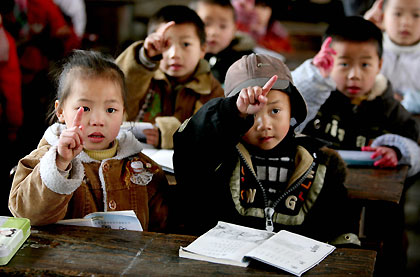China outrun UN goal on child hunger
By SHARON LaFRANIERE (New York Times)
Updated: 2006-05-03 09:17 JOHANNESBURG, May 2 — China has made huge strides
in reducing malnutrition among children over the past 15 years, while India
recorded only modest progress, and eastern and southern Africa made no gains at
all, according to a new report by the United Nations Children's Fund.
|
 |
|
Chinese children attend a class at a primary school in China's
rural Panghai town, Guizhou Province March 1, 2006. Spending on education
is expected to take up a record 4 per cent of China's gross domestic
product (GDP) during the coming five years.
[Reuters] |
More than one in four children in the developing world are undernourished,
Unicef said, a decline of just five percentage points since 1990. At that rate,
officials said, the world will not meet the United Nations target of halving the
number of undernourished children by 2015.
"This is unbelievably slow progress and far less than what is needed to meet
the goals," Rainer Gross, chief of nutrition for the children's agency, said in
a telephone briefing from New York. The report "should be a wake- up call to the
world. We are far off course," he said.
Health experts estimate that malnutrition contributes to more than half of
the 11 million deaths of children under 5 every year. The United Nations report
focused mainly on children under the age of five who are underweight, one
indicator of malnutrition.
China has surpassed the United Nations' goal for 2015, halving its percentage
of underweight children and reducing the rate of death among children under age
5 by more than one-third, the report shows.
In India, on the other hand, the share of children who are undernourished
dropped by only 6 percentage points since 1990, leaving a staggering 47 percent
of children under 5 underweight, the report said. Together, India, Bangladesh
and Pakistan account for half of the world's underweight children, the report
said.
"South Asia is the worst performing region," said Dr. Gross. "Children in
this region are living in an almost constant state of emergency."
In southern and eastern Africa, nearly 30 percent of children are
underweight, just as in 1990, according to the report. Officials blamed the AIDS
pandemic, increasing poverty and declines in agricultural productivity, among
other factors.
Dr. Gross said the main cause of malnutrition is not food shortages, but poor
diets with too few vitamins and minerals.
|